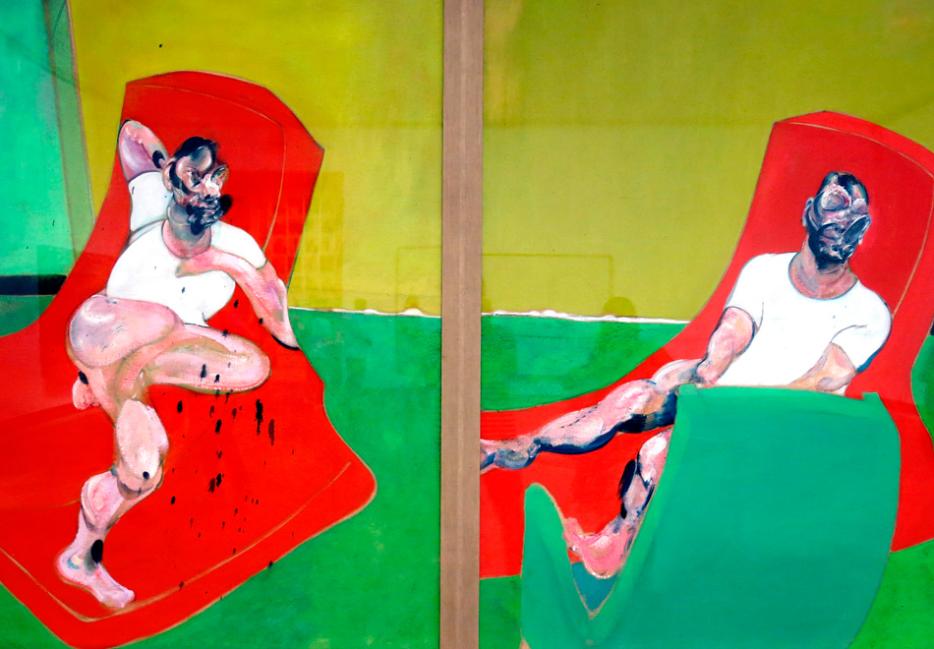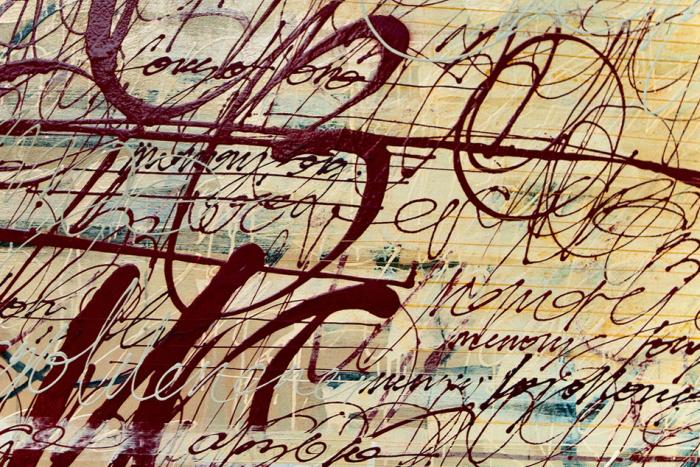I'm a mentally ill artist, which means I have a cute mascot in Van Gogh. It also means that, every day, I take drugs that make my life less interesting.
My lunatic cousins and I have been a curiosity for millennia. From ancient morons like Aristotle to Buzzfeed's beleaguered freelancers, seemingly everyone wonders what we're up to. The classic line about delusional creatives is that our delusion is our uneasy superpower. We, the cliché says, make great art because we can find and articulate the strangeness that jingles at the edge of consensus reality. Five hundred years ago, it was called possession, by demons or faeries or passing farts of the divine spirit. Today it's pop science—research has finally proven that novelists cry more than you do.
I think this is all bullshit. I think we outpatients become artists not because we're inherently, magically screwed up, but because we do screw up, all too mundanely. And screw-ups, mentally ill or not, are drawn to the arts. The great artists I'm privileged to know are all lazy, insecure fuckarounds, all half-smart, doing fan dances with vague and only vaguely correct intimations about the world.
Why should that be? Surely there are practicalities at work—like the fact that being a touring bassist, for example, doesn't require sobriety or strong SAT scores. A scatterbrained artist seems a little glamorous, while a scatterbrained lawyer seems a little disbarred. But I also suspect there's something deeper going on.
Art becomes dear if it helps you define yourself. Or if it defines someone you really want to make out with, or be. Artists play with how humans arrive at those definitions—and seeing self-identity as a game is easier if you don't have a strong self, if you're constantly fluttering away from yourself, like a cat confused by its reflection.
Which is typical of someone with my genetic flaws.
*
To write about my experiences being a mentally ill artist, I have to go ahead and call myself an artist, which is a nauseating thing to say. It feels like telling someone about the pooping you just did, while also implying that they should donate to or otherwise support your poop. Plus you probably haven't even heard of me, or only faintly have, like Greenland. I only comfortably use the a-word because I was recently covered by a fancy fashion magazine, and according to my ex-girlfriends, appearing there next to Miley Cyrus was the exact moment I went pro.
Nevertheless, whatever you judge me to be, mental illness—the fact that I'm a certified insane person—is the reason I do my thing. Those credentials are more easily demonstrated than my creative credibility.
I'm diagnosed with Bipolar II, which is less fun to look at than Bipolar I, the disease that leads a competent young woman to, one day, be spoken to by an angel in the shape of a blue balloon who commands her to empty her savings account into a heavy diamond ring so she can propose to a dog. She drops to one knee and, an hour later, learns that psychiatric hospitals almost always smell like piss. By contrast, those of us with Bipolar II never lose our shit so picturesquely. We don't find ourselves in a flaming chariot, we just find ourselves alone, staring at our phones, longing for company even though all our friends suddenly seem revolting. We buy a car we don't have money for in May’s mania, and drive it off a cliff when we come down in June.
Mania removes your self-doubt, which, as it turns out, is the one thing you need to write a good song.
Technically, my species of mania is called hypomania, because it doesn't include total psychosis, but mania is a more gorgeous word, and mania is gorgeous.
Mania feels so improbable and so lovely that I have often tried to describe it, to myself and others, in the vain hope of bringing back a moment of that feeling, the same way you stay up late reading old e-mails from an ex. Let me subject you to one of my attempts at explaining how it is.
Your consciousness is powerful, but usually it’s refracted uselessly through worry and memory—whether you need to charge your phone, how the President might smell, whether there are hamburgers on other planets, what your co-workers think of you. Spangles of survival instinct, little clenches of sensation, and smears of social temperature-taking clatter around inside you. Frequently it makes you tired just to think about how tired you are.
But if you're lucky, you get a few minutes every year during which you escape the normal thicket of your thoughts. Your mind goes to a large, quiet place that feels completely different. Not like the dull watchfulness of meditation, but like the total engagement just before a first kiss—when the sweetness of someone’s lips is felt before they touch your own, and you’re already alive to the pain of that pleasure’s passing. All the stuff in your head gets narrowed down to a pinprick or, more properly, a spotlight, shining directly on the smile opposite yours. Your consciousness, I assume, is frequently complex and boring, but you know how it feels when it briefly becomes simple and gigantic, a chasm crossed in one casual step.
That’s what mania feels like, but all the time. With everything. With a Twinkie or a stubbed toe. Mania makes it feel like you were wearing a condom on your whole reality and you finally took it off. Everything is richly significant and completely harmless. Go ahead: Drop all your courses and write a bad movie about your childhood. Buy expensive sex. Wear a sequin suit.
You might attract concern, because you seem erratic and irritable, and your sequin suit is pretty tacky. But from the inside, you calmly enjoy your racing ideas, each one different from the last but all seemingly connected. It's a rainstorm, and every drop reaches out to touch the next.
Mania removes your self-doubt and thus makes you a total dumb ass. But lots of dumb asses are happy and live fun, if not long, lives. So that's mostly fine. The problem is that when mania leaves, you feel like a fraud for ever having been happy. You decide you don't like the sky anymore. You disappear.
I did this every few months for most of my life, until I was medicated properly. At the tail end of a springtime's sweet episode, I was on a perfect third date with a sensitive and beautiful woman. At a farmers’ market at dawn we ate fresh fruit, raw elk, and chestnut honey by the spoonful, and found ourselves abruptly confessing a lot of things we had planned to wait longer to talk about. But the manic episode ended just before our fourth date, when I abruptly ended our nascent relationship for no reason at all. I didn’t leave the house for a week. I ate Pop Tarts until I puked and plucked at my pubic hair. Calmly recollected on mood stabilizers, this makes for a great song. It also makes for a lousy life.
*
My music career began during my most severe episode, which was triggered by prescription amphetamines. By the way, do you want some prescription amphetamines? You can get them any time you want, because they are employed as a treatment for Attention Deficit Disorder, and—no disrespect to its legitimate victims—it is trivially easy to mimic the classic symptoms of that disease. You can pass for chronically inattentive by simply not paying attention to the first psychiatrist who calls you back. He'll give you a personality questionnaire, and you will fill it out sloppily, with odd loopy handwriting and Xs that barely caress their intended box. Bingo bango boom, prescription.
On amphetamines, I started to see music when I closed my eyes. Ear worms registered as a faint glow. Melody began to replace my interior monologue. Percussive pulses crept behind my forehead during conversation. Sex was soundtracked stereotypically. And any music outside my head was rapidly orchestrated by the music within—I wanted every other handclap of Nicki Minaj's “Stupid Hoe” to arrive on the back of a stab of violin.
I felt myself becoming the kind of wild savant described by Theseus in A Midsummer Night's Dream: “the lunatic, the lover, and the poet / Are of imagination all compact.” I always suspected I was some sort of visionary, that there was something alien and unspeakable within me, waiting to be tapped, like Eminem in 8 Mile. I prepared myself to be greeted with massive acclaim and frequent envy.
Except all the songs that came arcing through me were absolutely terrible. Like, all of them—noxious little ditties that were, somehow, both annoyingly precocious and totally stupid. Imagine the work of Paul McCartney's douchey parrot. At the time, the cries of that parrot seemed beautiful. To me, it was a tragedy that my songs weren't blaring through every frozen food aisle in Thailand. I regret that I cornered dozens of people during this nadir of mine and played them tinny recordings of my terrible repertoire, and took their awkward looks as a coy struggle against the urge to prostrate before my triumph, a struggle to understand my immensity.
I'd really like to be writing about becoming a mad genius, because I'd like to believe that such a person exists. I'd like David Foster Wallace to have died of being a saint, not of the trickiness of medicating depression.
Mania removes your self-doubt, which, as it turns out, is the one thing you need to write a good song. You need to hate your work just enough to almost not make it every day. Well, you might say, even if you were mad, at least you were madly propelled to become who you really were. No. During the same period of time, I was equally inspired to become a chimneysweep. I saw the true beauty of my soul surfacing in a sooty fireplace in Glasgow. I now dimly reflect on the fact that mania had revealed my true self to me many times before. In previous seasons, mania had also suggested that, in my very most soul, I was: a social worker, a piano tuner, a videographer, a pornographic performer, and, worst of all, a novelist. I'm only a musician and not a chimneysweep because I was medicated out of the delusion of being a musician just after I spent a lot of money on that delusion and told all my friends about it, too. I decided to keep the delusion going. I wrote my first decent song a week after I started taking Lamictal, the drug I also took this morning.
*
I have pierced the veil of your perception, and I have dreamed dreams beyond your comprehension, and they were boring. I'd like to tell you different. I'd really like to be writing about becoming a mad genius, because I'd like to believe that such a person exists. I'd like David Foster Wallace to have died of being a saint, not of the trickiness of medicating depression. The former is a line of Romantic poetry; the latter is grotesquely cruel and arbitrary. The latter option means that if Sylvia Plath had the same doctor I have, we could now be lamenting the shittiness of her Twitter feed. The archetype of the wise maniac is so seductive that even when I was craziest, I didn't feel like I was crazy, not like I wanted to be—I read how Elliott Smith wrote some of his best music after carving a bunch of words into his forearm, and a part of me went, man, if only I had the guts.
Of course I can't prove that there's no truth in hallucination whatsoever, for anyone. But I'm hugely skeptical, because my mental illness gave me a feeling of insight, a feeling that I was truly brilliant after all—and that feeling turned out to be totally empty the morning after. This is disheartening, but also a valuable reminder that insight is as transient and untrustworthy as, say, sadness. Depression lures you into a total and false conclusion that you're worthless. Mania—that is, inspiration—lures you into a total and false conclusion that you're tremendous.
During my adolescence I met a crop of people with my disorder or another who refused treatment, so as not to snuff their inner fire. Matthew, album forthcoming, texts me sometimes at 5 a.m. to invite me over for opiates, even though I've declined these invitations for years. Patricia only communicates through long Facebook updates about the conspiracies she's sure are keeping her canvases from the public. Charles is reachable by Ouija board only.
My people flunk out of relationships, incinerate potential careers, and botch college thoroughly enough that a painter's tiny salary looks like a miracle. We end up half-rehabilitated, in a wobbly orbit around whatever society we barely belong in. We struggle to be regular screwy, not catastrophically screwy. That's the real genius of mental illness, I think—if you're lucky, it can make you into a curious imitation of a healthy member of humanity.
If you find the love of a good therapist, and you can dance in the skinny spot between total despair and the bleak equilibrium of too much lithium, you can probably spin your solitude into a cute little memoir. And if you get too comfortable, your discography tends to suffer, quickly or slowly. And if you let your prescription lapse, you load your jacket with stones and go swimming.
Imagine a very determined little finch trapped in a giant bell jar, attempting over and over again to escape, every time at a slightly different angle, hoping that this particular flight path will find the freedom that its little bird eyes are unable to distinguish from the glass. Imagine you lift the bell jar, and the bird immediately flies far and fast in whatever direction it happened to be flying—whatever direction would have taken it to a collision the moment before. That's how it was for me—mental illness bears responsibility for who I am like the bell jar is responsible for the final vector of the finch.
*
I can't tell you about the story of my recovery, because it centers around some classically sad stuff with my family I won't discuss publicly until a couple of people die. It's a shame about its omission, because it's good reading—truly vivid despair, easy to write well—and because if you knew about just a couple of things I won't allow you to, this essay would seem way more convincing. Befriend me, get me drunk, or talk to me in thirty years.
The truncated version is that one of the psychiatrists I had tried to enlist as a dealer called me back, six months later, and asked me if I was doing okay, did I maybe still need a psychiatrist? And in a cocaine-ish cadence, in endless sentences littered with baroquely twining subclauses, I told him that I was feeling totally cool and chill ever since my last psychiatrist put me on amphetamines. He silently noticed that he was talking to a maniac. Like a sweet-voiced Scientologist, he took hold of my narcissism and lured me with the prospect of a free evaluation. To him I now owe everything.
There's this one other thing I want to tell you about.
Last summer, a young Marxist was giving me a long lecture about my flaws, in the way that can happen sometimes. You try to have a conversation on a patio and you get conscripted into somebody's idea of the human condition. Anyway, this Marxist. He was berating me for choosing my current sobriety over the bipolar life I lived before. He explained to me that the concept of mental illness is a conspiracy of our capitalist overlords. People like you, he said, don't make orderly subjects, so they send doctors to bully you into consumerism. He suggested I should stop taking my medication, because anything is better, he said, than slowly becoming another dissatisfied peasant working mindlessly to warm the planet. He reminded me that our civilization is suicidal and the apocalypse imminent—we're all just futzing with our tablets and breeding ourselves to death. He was telling me that I was a coward for fleeing from what he felt was my true identity.
In that moment, I wanted to thank him for his interest in the burgeoning field of Sasha Chapin Studies and then punch him in his stupid mouth. On reflection, he's not necessarily wrong. Whether we're designated mentally ill or just normal fucked up is mostly determined by whether we continue to show up at the cookie factory every day. The question you get most from doctors—after “Do you feel like there's no hope?”—is “How is this affecting your work life?” All of the compelling people I know experience neural states that could easily be called a sickness and would be, if, say, they were in the Marine Corps, and not in a dance company. Mine, on initial appraisal, seem more extreme, but that may not be true.
But, finally, that doesn't matter at all. What matters is that I have two choices: the sanity defined by my so-called mental illness, and the sanity defined by everyone else. I can sing songs to myself as I huddle in a dazzling bubble by the radiator, or I can sing songs to a civilization rapidly inventing the robots that will probably harvest our organs for fuel. I'd rather not be alone in my feverish interior when they deconstruct me. I'd rather be here, in what might be called sanity, with you. For now, I've made my decision. I know what kind of song I'd rather sing.






